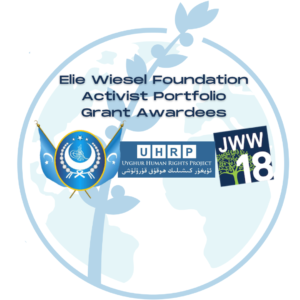by Annie Turnbull (Cord Africa Programmes Operations Manager)
We arrived in Farchana in Eastern Chad just a couple of days ago to visit projects funded by Jewish World Watch and implemented by Cord. Jewish World Watch first established a Solar Cooker Project in Chad in 2005, expanding their support for this work further when they began working together with Cord in Chad almost two years ago. Now that some time has passed for the project to get established, Janice and Diana from JWW and I are travelling together to see how our work is developing and to meet with some of the women who are involved in the project.
Driving from the Cord office into Farchana Refugee Camp feels a little like navigating across the surface of the moon. Sand, dust and rocks punctuate the crater-like hills and dips, as we bump up and down in the back of our vehicle. As the road drops down to cross the dry river bed by the market place, we pass between a small but vibrant group of trees, which provide a flash of green — one of the only other colours which contrasts against the bright blue sky. Driving through this much-needed shade from the desert sun is a reminder of how little can grow and thrive here.
Cord, a UK-based organisation for whom I work, began working in this area in 2004, after hundreds of thousands of refugees crossed the border from Sudan to flee violent conflict in Darfur. Cord, with our partner Jewish World Watch, and other organisations, provide services in the camp to help the refugees as they try to recover from the trauma they’ve experienced and to carry on their lives as normally as possible.
More recently, together with Jewish World Watch, Cord has established a solar cooker project, to protect and empower refugee women by reducing the time they spend outside of the camp collecting firewood for cooking (where they become vulnerable to rape and sexual violence). Now, instead of spending many hours walking miles to gather up the smallest bits of wood in this harsh and arid landscape, girls and women (who traditionally take on this role in the Sudanese culture) are able to spend more time in school learning.
To learn more about what life is like for students in the camp, we visited one of the schools which Cord has been supporting. Janice brought questions posed by 7th and 8th grade students in Los Angeles who are studying Darfur and refugee-related issues. In many ways Aisha, a pupil we meet at Darfur School in Farchana Refugee camp, is not so different to a Grade 8 student you might find in any other primary school; she carries a pink High School Musical backpack, her favourite subjects are English and maths and, when she finishes studying, she dreams of becoming a doctor. But Aisha is 22 years old. Her education was severely disrupted by conflict in Darfur and then by the massive upheaval of moving countries, when she and her family were forced to flee Sudan. She tells us of their journey to reach the safety of Chad. Her story is tragic and moving; people being burnt alive, babies taken from their mothers’ backs and killed, and girls and women raped and brutalised. As we talk to a group of around 15 pupils, their faces tell us of the horrors they have encountered, coupled with their utter dejection at the 9 long years they have spent as refugees, with little hope of returning home in the near future.
Despite these harrowing experiences, Aisha feels that she and her family were fortunate to reach Chad together and to find refuge in Farchana Camp. She and other refugees here tell us how grateful they were to find organisations willing to help them. Now married, with a small baby, Aisha is working hard in school to catch up on what she has missed. When talking of the future, she speaks with confidence and a smile. We ask her if she has a message for students at a school in Los Angeles which supports Jewish World Watch and Aisha grasps the opportunity to advocate for the things her school needs; exercise books, pens and text books. She tells us she wants to have the same opportunities that other women have. She wants to learn and grow. Despite everything she has encountered, she is full of hope and potential.
As we’re leaving the camp later in the day to drive back to the office, we pass by another flash of colour against the desert backdrop. But this time it is the gentle pink of some delicate desert flowers which have sprung up on some of the rockiest ground we have seen anywhere in the camp. These little blooms, that have struggled up through the stones and dust, seem to symbolise everything we have heard today about new opportunities being created and hope continuing to flower in the harshest and most desperate conditions. Even if we can’t help them return home, it serves to underline our responsibility to encourage and support these refugee communities as they grow through hardship and dependence towards self-reliance. I am grateful to be working to enable such growth in the context of such trauma and hardship and I am grateful for JWW’s partnership with Cord. I am especially grateful that I was able to make this journey with Janice and Diana.


